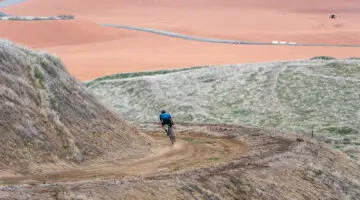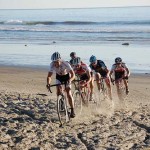
These Masters racers at the World Cyclocross Championships in Belgium, 2009, have a better chance of avoiding falls and dementia as they age. © Joe Sales
by Don Yungher
You already know that cyclocross is good for you — you are informed reader of Cyclocross Magazine, after all — and you certainly know ’cross is good for your body. It strengthens your legs, and it strengthens your arms and core. It’s good for the heart, and for the lungs, and for the waistline. It’s good for pretty much everything — except the skin of your calves and ankles that your pedals always tear up.
You also know that cyclocross is good for you psychologically. It gives you that endorphin rush, like any good workout, but it also lets you play in the mud. And cyclocross has a family feel to it, with a wonderful inclusivity that makes newbies and Euro-pros alike feel welcome. And can you think of any other sport where it’s perfectly acceptable to shout “woohoo!” in the middle of the toughest part of the event?
So far, I’ve just been preaching to the choir, as you already know all this stuff. But what if I told you that there is another benefit to cyclocross, one that pays off in the long-term and may help you in your senior years?
My research for the past few years has been focused on making life better for healthy older adults. The idea being that a lot of functions (sensation, strength, etc.) decline with age, but we may be able to fend off the worst of it, or at least minimize its risk.
And, a caveat before we get to the good part: this isn’t a cure-all, it’s not guaranteed to do anything, and you absolutely should talk to your doctor rather than trust some guest blogger if you have concerns.
One of the biggest problems facing the elderly is the possibility of falling. It seems to strike out of the blue, and once you’ve fallen, you’re much more likely to fall again in the future. And the fall itself isn’t the scary part; rather, it’s the broken bones or torn ligaments that confine you to bed, and then require years of therapy and may never heal completely. Falling can suddenly change a vibrant, active senior into someone sedentary and depressed with a shorter life expectancy. Falling is scary.
To prevent falls, physical therapists are developing “prehabilitation” regimes to strengthen and train people who are at risk. These workouts prepare the body to respond to balance changes, empowering the systems that are necessary to keep the feet under the body. Research is ongoing, but it all seems promising.
Many of these prehab workouts, and the real-world activities that inspire them, have direct analogues in cyclocross. For example: a therapist may have you stand on an uncertain surface, like a foam mat, to train the balance systems not to rely on a flat, solid surface. Anecdotally, many older adults with lower fall risk include hiking among their hobbies.
If we’re looking for exposure to uneven terrain, we need look no further than cyclocross. Every time you run the beach at the Rad Racing GP, or scramble up the loose rocks at Cycle-Smart International, or (my favorite) race through any mud pit anywhere, you train your body to sense its balance, and also to generate the rapid, precise movements necessary to not take a spill amid the jeers of the beer garden. And it’s pretty likely that this strength, balance, and “muscle memory” will help you in less-extreme, but far more dangerous, situations in your old age.
Would you believe that cyclocross may also help preserve your cognition and memory? Well, consider your training. You may occasionally ride the trainer on a stormy day, or use the rollers for recovery, but for the most part, your workouts are outdoors. How else will you practice your off-roadin’ skills, or your dismounts and remounts and portaging? And as autumn approaches, you also incorporate some jogging, which I have to do outside because treadmills crush my soul.
Well, it turns out that all of these outdoor, non-stationary workouts are good for your brain. It’s been shown that a daily walk helps stave off dementia (and here is where I might make a joke about ’cross racers being a bit demented already, but I won’t because this is actually pretty serious). Fascinatingly, walking on a treadmill without having to navigate has significantly less benefit for your brain. Keeping track of where you are, as you would on a ride or a run, keeps your brain healthy. You may be able to reduce your risk of mental decline in old age by getting outdoors and training for ‘cross. How great is that?
Let the gym rats ride their spinning bikes and fight their elliptical machines. And let the roadies and mountain bikers avoid dismounting like the plague. You’re a ’cross racer, and you’re investing in your future. And you even get to play in the mud!
Don Yungher is a bad-to-mediocre cyclist and a cyclocross evangelist who may or may not have bullied CXM editor Molly into the knobby-tire lifestyle. He received his Ph.D. in Biomedical Engineering at Rutgers, where he competed in road, cyclocross, MTB, and karaoke for Rutgers Cycling. He is currently a postdoctoral research fellow at Mt. Sinai School of Medicine Neurology Department.
[Ed. Note: for those of you who read The Girl With The Cowbell Tattoo columns, you may remember Don as my favorite “pep talk guy” from the Race Face column in June.]























